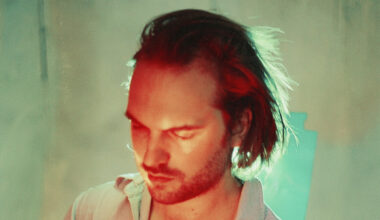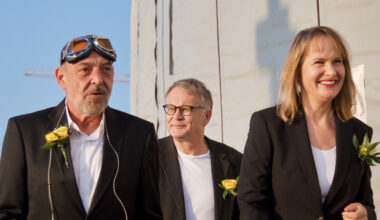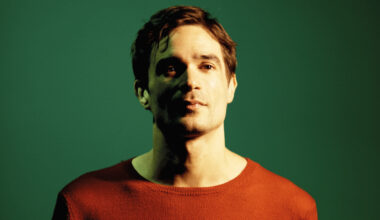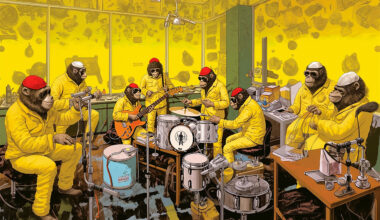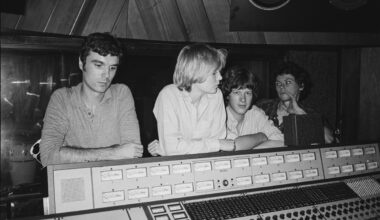Stepping into the solo world after a raft of collaborations, the delicate work of Erland Cooper
London’s Hoxton is not the hedonistically hip neighbourhood it once was, but at weekends it’s still a rowdy playground well into the small hours. Here on a cobbled backstreet, Erland Cooper has a long lease on a studio. It’s an environment in sharp contrast to his childhood home in Stromness, Orkney, but take the steps into his basement recording room, and the warm wood tones, ambient lighting and sound of Stars Of The Lid drifting from speakers combine in instant, restorative calm.
This place is both creative nerve centre and retreat. It’s where the songwriter, musician and composer has reconnected with the natural elements that define the northern archipelago – which, as he puts it, “stubbornly clings on to the rest of the UK” – via his ‘Solan Goose’ album of 2018 (air) and the imminent ‘Sule Skerry’ (water), with the third part of the trilogy (land) already planned.
Orkney is as much muse as subject matter for Cooper, whose identity is strongly tethered to the place despite the fact that at 18, he couldn’t wait to get away. As we settle in on a leather couch, he pours from a pot of green tea and quotes the late poet George Mackay Brown as a way of explaining the particularity of their shared birthplace: “The essence of Orkney’s magic is silence, loneliness and the deep marvellous rhythms of sea and land, darkness and light”. However, Cooper was using those aspects as a lodestar well before ‘Solan Goose’ (it’s the Orcadian name for the northern gannet).
“George’s poem came up in The Magnetic North and, I ultimately realised, in Carnival,” he says, in his soft brogue, referring respectively to ‘Orkney: Symphony Of The Magnetic North’, the debut album by the band he formed with Hannah Peel and Simon Tong, and his first, folkish art-rock project, Erland & The Carnival. “I’ve realised that in everything I do, I keep going back to Orkney, back to the start and, for me, nature is the one true reset. It resets my clock, my mind, even briefly, and by that I mean just a walk or being by the sea. I have that in me every week of my life and that’s what this new record is about, really – it’s about safe places. And a call.”
Cooper’s first heeding of that call is what sparked his solo debut, which he made “with no plan or intent”. In fact, he sat on ‘Solan Goose’ for six months before he played it to a soul. He’s spoken before about the anxiety and claustrophobia that used to grip him whenever he travelled into central London on the Underground, but chooses not to do so now because he’s concerned that it devalues the more serious mental health issues faced by others. Still, he admits to having found that trip to his studio “quite a stressful situation” and, in time snatched between other projects, began working on what was a kind of coping strategy, using “street noise, the ambient noise of builders or whatever” as his raw material.
“I’d come down the steps and go to one of these synths, and I’d find the key of that quite stressful tone and diminish it down to a gentle tone – much like what you’re hearing here,” Cooper says, waving a hand at the background music. “I’d improvise something on the piano and then I’d leave it. I’d do another layer every so often and then get to the point where I’d name these little demos. And my brain found it very funny to name them after the birds in Orkney, in the local dialect. Before I knew it, I’d built up a collection of songs, which was ‘Solan Goose’ from start to finish. While I travelled around on the Underground it would remind me of fond childhood memories, which were ultimately a reflection of Orkney, where I grew up.”
So much for the maxim that says you can never go home. Cooper – who’s lived just outside of London for around 10 years now – returns to Orkney three or four times a year, but is constantly revisiting emotionally and psychologically, through his music. The new album ‘Sule Skerry’ is named after a tiny outcrop to the west of Orkney Mainland, and features local dialect in its track titles, for example, ‘Spoot Ebb’ (a low tide that reveals razor clams), ‘Haar’ (sea mist) and ‘Groatie Buckies’ (small cowrie shells). It also uses field recordings made by Cooper: the sound of thunder has made its way into ‘Haar’ while on ‘Creels’ a local recounts the alleged sighting of a selkie, a mythical creature that can transform from seal into human by shedding its skin. There are layers of tape loops and other electrickery, manipulated strings, a Moog and modular synths, plus guests including Kathryn Joseph and Kris Drever, who both read a poem written for the album by Will Burns. Cooper’s determination to capture Orkney’s spirit even has him recording the impulse responses of spaces like Stromness Town Hall, underneath a pier and inside a Neolithic cairn.
“Reverb only sounds like reverb in the studio,” Cooper says, “but I thought what an interesting way to take the landscape back with me – some of my favourite sounding spaces. Now, in the studio I can mix anything I want inside the cairn, say, or under the lifeboat pier, because I’m attaching the reverb of the landscape. So, that bubbling synth at the start of ‘First Of The Tide’ is actually a synth played through the Cuween Hill cairn.”
He laughs loudly.
“It’s like, who cares? But I care, because when I listen to it, it tickles me. What interests me about it is how a sound resonates in a space,” adds Cooper, with obvious delight. “I thought a cairn might just sound like a toilet, to be honest, but it didn’t! It had this dark resonance that was quite spiritual, which makes sense, because the architects who built these Neolithic dwellings to put their dead in and worship them, 5,000 years ago, knew all about acoustics and space. They knew they could do a sermon in there in a whisper and how the voices would carry. So, I figured it would be great if I asked for permission as I walked through the cairn.
“I was in there with a cameraman and he got a bit freaked out – it’s quite intense. But it’s not just a narrative; I’m interested to see what happens with the resonant frequencies, because as I’ve said many times, music is patterns of sound and sound is frequency. And as intimidating as the classical world may be and as complex in its musicality and instrumentation, it can ultimately be broken down to a harmonic texture. So, if the harmonic texture inside a cairn is interesting and sounds different to me, then I’ve achieved what I wanted.”

On ‘Sule Skerry’ there are again traces of the work of Jóhann Jóhannsson, Ralph Vaughan Williams and Peter Maxwell Davies in vividly imagistic tracks that mix electronic experimentation with contemporary classicism, but it’s maybe less reassuringly light and lyrical than ‘Solan Goose’. ‘Lump O’ Sea’ in particular is a darkly dramatic piece that suggests the ocean’s endless heaving.
“It’s about subverting expectation,” says Cooper. ‘There’s a lot more cross rhythms on the new record – and tension, because when you look over the side of a ferry and down at the water, it churns. It’s not quite as ambient as the last record, so people thinking it’s another soundscape…” he trails off. “All I’m trying to do is capture an essence of home and of childhood memory, and the closer I get to that, the better. In the work of the artists I adore everything is implied, like Margaret Tait’s work in film in Orkney, where she finds the magic in the everyday and focuses in on that. In musical terms, I’ll let you decide if you think it’s evocative of Orkney or of Brighton, the Maldives or whatever. It doesn’t matter.”
Ask Cooper whether there’s a risk of idealising a place as singular as Orkney once you’ve left and of signing up to the 19th century Romantics’ view of the divine majesty of nature, and he concedes that “it’s very easy to go to Orkney and romanticise it. But for me, the best time to go is when the tourist season’s over and there’s only one pub open – that’s when you get the real magic. That’s when you see that storytelling is the heart of a community and you see what the weather can do, changing four times in one day. Whether that’s romantic, I don’t know.
“Ralph Vaughan Williams would create these huge sweeping melodies and elements from going out in the field and interviewing farmers and shopkeepers and all parts of a community. He would take away these beautiful melodies and songs and extrapolate them into orchestral symphonic masterpieces. They’re very pastoral and very romantic. I’m more interested in keeping the source – the voice of the man ploughing the field or the melody of the song he was singing – and sticking to it, rearranging and adding parts. That’s what my first record [as Erland & The Carnival] was really pillaging.”
However strongly Cooper’s childhood environment is bound to his music, it’s not to the exclusion of all else. He’s used London as a conceptual springboard, too. Last October he released an ambient techno EP called ‘Nightflight’, which worked as a decidedly urban companion to ‘Solan Goose’ and was inspired by what he experienced whenever he stepped outside his Hoxton studio late at night.
“It touches on the hedonism I would see on a Friday night when people are like… [Cooper bugs his eyes] and I thought well, who am I to judge? So I set myself a bunch of rules: I could only write this work standing up; I couldn’t labour on a layer for more than 10 minutes; and I had to do it on a Friday and a Saturday night.”
Cooper’s a big admirer of Jon Hopkins and Daniel Avery, and once asked the former if he’d do a remix, but was told he was busy for two years.
“So I made my own version,” he smiles, “and when I put it out I said, ‘This wears its influences on its sleeve. Take it or leave it’.”
More recently he wrote the music for Nest, an experiential light and sound installation that ran for three days in January in London’s Waltham Forest Town Hall, and involved recording over 1,000 voices, from local school children to experienced choirs.
“I absolutely loved it,” he says, “70,000 people came through the gates over the weekend and I want to do more collaborations with brilliant people, and more projects that move you in a subversive way.”
Instrumental soundscapes have a kind of in-built emotional shorthand that is maybe easy for artists to fall back on. “Ambient” music with a classical element especially has the power to trigger a whole range of feelings for the listener, but that connection comes with a responsibility on the artist’s part to be both truthful and vigilant. In a recent conversation Cooper had with film director Sally Potter, she raised an interesting point that’s stuck with him.
“I’m trying to relate it to music because I’m really fascinated by the creative process, ultimately more than anything else. She said she never does a single note of music until she’s finished the cut of the film – she doesn’t use temp music. She said the moment you do that, it tricks you into thinking you’ve got a finished piece of work. I think that in audio, layers do that, so I’m always stripping back. It’s so easy to kid yourself, particularly in here, where you can get things sounding very good very quickly.”
It’s a pitfall Cooper’s avoided with ‘Sule Skerry’. Its grounding effect is the result of its deep connections to nature – specifically, to the sea – even if its expressions are often so heavily disguised only Cooper knows their origin. But his intent is clear.
“What I’m trying to say with this record is that the minute you step out of your safe place, it’s difficult and you’ve got to protect yourself. Anything could happen and there’s good times and bad. That is life. Our peers and our friends pass away, there are complexities, this country has all sorts of problems; all I’m saying is nurture your safe place. And your safe place might just be a good book in a crappy bedroom.
“For me, the sea symbolises that better than anything else. Calm waters on a wee flattie [flat-bottomed boat] or a ferry, a cruise liner in the Bahamas, whatever – it can change like that.” Cooper clicks his fingers. “But it’s how you deal with it that’s important. And that’s all I’m trying to say.”
‘Sule Skerry’ is released by Phases

